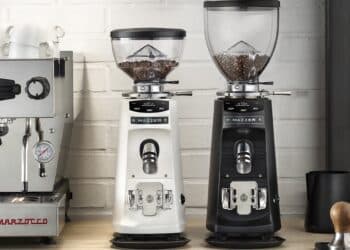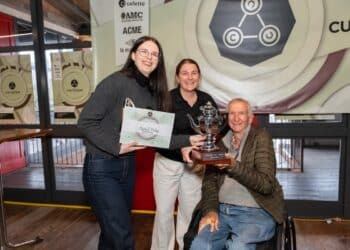After more than 10 years in the Australian market, Fairtrade Australia and New Zealand CEO Molly Harriss Olson says there’s a dominant roadblock she’s keen to put to bed.
“Roasters and importers think that we stand between them and the farmer – however, instead of being a barrier, we act as a business conduit so that businesses and roasters can access fairer trading mechanisms that benefit farmers and producers, as well as their own businesses,” Molly says.
Fairtrade is a system that advocates for decent working conditions, fair prices for farmers, sustainable practices, environmental protection and the empowerment of farmers and workers in developing countries. Fairtrade Australia and New Zealand is the independent non-profit organisation that licenses the use of the global Fairtrade mark to internationally agreed standards.
According to Fairtrade International, 80 per cent of the world’s coffee comes from smallholder farmers, which includes cooperatives. Around the world, 25 million smallholders produce 70 to 80 per cent of the world’s coffee, which is one of the reasons Molly says Fairtrade focuses its efforts on small-producer organisations.
For those that question where Fairtrade sits in the chain, Molly says it’s easier to think of it as a form of direct trade – with greater benefits.
“Many of our licensees have visited origin and met the farmers and cooperatives where the coffee they buy is produced,” she says. “If one roaster needs four different single origins, we can help enable this by connecting them to traders to source coffee from Fairtrade certified farms.”
But before that, Molly says there’s often a burning list of questions curious customers want to know, including questions about value, the story behind the coffee, ease of access to product, its quality and the effort needed to trade on Fairtrade terms. So let’s break it down.
What’s the aim?
Since Fairtrade began in the Netherlands more than 30 years ago, the organisation’s core values and mission have remained consistent: to uphold the principles of transparency, fairness and equality. To do that, Fairtrade empowers producers with fair prices and economic independence.
For the next three years, Fairtrade has developed a 2016-2020 strategy in line with the United Nation’s Sustainable Development Goals to:
• See the benefits of trade being distributed more equitably
• Ensure human rights are respected throughout the supply chain
• Put fairness and justice first in trade decisions.
Is Fairtrade a growing movement?
Fairtrade retail sales have increased by 70 per cent in the past five years.
Coffee is responsible for 30 per cent of the total growth of Fairtrade sales over the past five years (second only to chocolate). Since 2011, Fairtrade coffee sales have grown from $20 million to more than $64.5 million. Molly says this is a result of an increase in branded retail, private labels committing to more volume, growth in out-of-home sales, and roasters, traders and consumers recognising the quality of Fairtrade products.
How Is Fairtrade Direct Trade?
n Molly says roasters sometimes question the importance of Fairtrade, generally because they “misunderstand” the system. Traders, however, see the value immediately because Fairtrade provides a quality-control mechanism. While “traditional” direct trade is still sustainable and powerful, Molly says Fairtrade’s version goes further to support farmers, offers quality control, provides an added ethical value and an independently-audited certification.
“Sometimes roasters don’t necessarily know what we do – we invest in communities rather than individual farmers, which means that investments can be made at a level that benefits many more people,” she says. “Overall, we’re known for having a commercial relationship with roasters, which means we understand and respond to the pressures roasters sit within.”
Fairtrade’s version of direct trade focuses on traceability, certification and independence. It enables direct trade relationships by providing access to information and supporting trips to origin.
“Traditional direct trade models pass the judgement of whether something is ethical or not back to the consumer, who is ill-equipped to judge whether or not the supply chain is appropriate,” Molly says.
Fairtrade supports roasters to build relationships with farming cooperatives instead of individual farmers. This way, roasters can support an entire community, and not just the wealth of an individual. “Every farmer still needs the support of its community for education, health and societal benefit,” Molly says.
The message must be getting through, with more than 100 roasters in Australia currently purchasing from Fairtrade-certified cooperatives around the world.
What’s the cost?
Fairtrade requires businesses to pay a “fair price” to farmers for their crop, which acts like a safety net against market volatility. Under the Fairtrade model, businesses pay a Fairtrade minimum price and premium price. The minimum price is a floor price to ensure farmers never receive less than the cost it took to produce their crop in a sustainable manner. The premium is an extra sum of money that cooperatives can democratically invest in community projects, quality and productivity.
How is this price negotiated?
“It’s not,” Molly says. “The price setting is far more rigorous than farmer input. The minimum price is set based on a consultative process with Fairtrade farmers, workers, and traders.”
Producers get paid at least the Minimum Price, and get paid the market price when this is higher. For example, the Minimum Price for coffee is currently set at US$1.40 per pound for washed Arabica coffee sold on Fairtrade terms. This Fairtrade minimum price has remained relatively constant over the past few years despite constant fluctuation in the market price for coffee. Molly says this is to ensure producers always have access to a “stable, consistent and predictable source of income” that allows them to save, invest and plan for the future.
This article features in the August 2017 edition of BeanScene Magazine.
To view the FULL article, subscribe here today: www.beanscenemag.com.au/subscribe
For more information about Fairtrade, visit fairtrade.com.au/
Images: Josh Griggs



